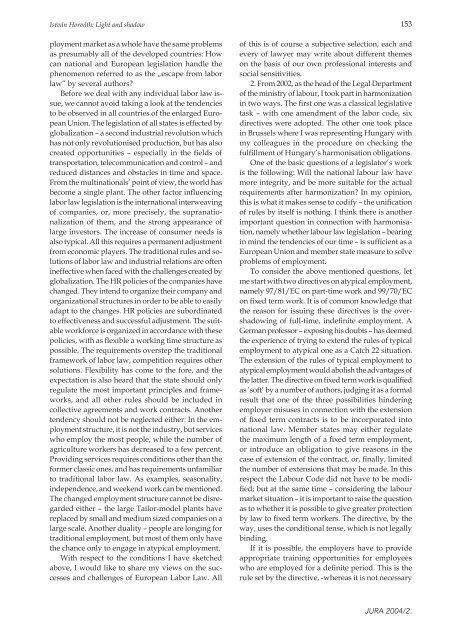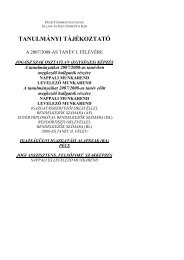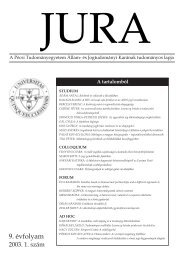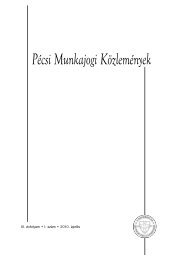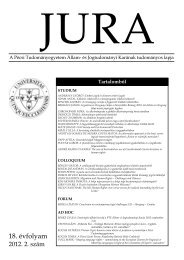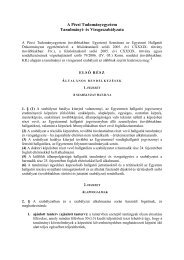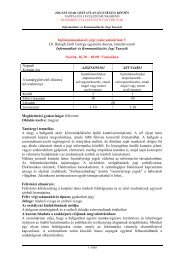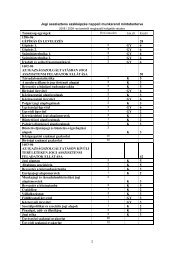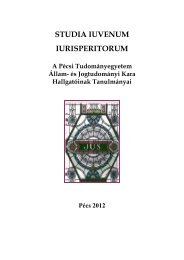2004. évi 2. szám - Jura - Pécsi Tudományegyetem
2004. évi 2. szám - Jura - Pécsi Tudományegyetem
2004. évi 2. szám - Jura - Pécsi Tudományegyetem
Create successful ePaper yourself
Turn your PDF publications into a flip-book with our unique Google optimized e-Paper software.
István Horváth: Light and shadow<br />
ployment market as a whole have the same problems<br />
as presumably all of the developed countries: How<br />
can national and European legislation handle the<br />
phenomenon referred to as the „escape from labor<br />
law” by several authors?<br />
Before we deal with any individual labor law issue,<br />
we cannot avoid taking a look at the tendencies<br />
to be observed in all countries of the enlarged European<br />
Union. The legislation of all states is effected by<br />
globalization – a second industrial revolution which<br />
has not only revolutionised production, but has also<br />
created opportunities – especially in the fields of<br />
transportation, telecommunication and control – and<br />
reduced distances and obstacles in time and space.<br />
From the multinationals’ point of view, the world has<br />
become a single plant. The other factor influencing<br />
labor law legislation is the international interweaving<br />
of companies, or, more precisely, the supra nationalization<br />
of them, and the strong appearance of<br />
large investors. The increase of consumer needs is<br />
also typical. All this requires a permanent adjustment<br />
from economic players. The traditional rules and solutions<br />
of labor law and industrial relations are often<br />
ineffective when faced with the challenges created by<br />
globalization. The HR policies of the companies have<br />
changed. They intend to organize their company and<br />
organizational structures in order to be able to easily<br />
adapt to the changes. HR policies are subordinated<br />
to effectiveness and successful adjustment. The suitable<br />
workforce is organized in accordance with these<br />
policies, with as flexible a working time structure as<br />
possible. The requirements overstep the traditional<br />
framework of labor law, competition requires other<br />
solutions. Flexibility has come to the fore, and the<br />
expectation is also heard that the state should only<br />
regulate the most important principles and frameworks,<br />
and all other rules should be included in<br />
collective agreements and work contracts. Another<br />
tendency should not be neglected either: In the employment<br />
structure, it is not the industry, but services<br />
who employ the most people, while the number of<br />
agriculture workers has decreased to a few percent.<br />
Providing services requires conditions other than the<br />
former classic ones, and has requirements unfamiliar<br />
to traditional labor law. As examples, seasonality,<br />
independence, and weekend work can be mentioned.<br />
The changed employment structure cannot be disregarded<br />
either – the large Tailor-model plants have<br />
replaced by small and medium sized companies on a<br />
large scale. Another duality – people are longing for<br />
traditional employment, but most of them only have<br />
the chance only to engage in atypical employment.<br />
With respect to the conditions I have sketched<br />
above, I would like to share my views on the successes<br />
and challenges of European Labor Law. All<br />
153<br />
of this is of course a subjective selection, each and<br />
every of lawyer may write about different themes<br />
on the basis of our own professional interests and<br />
social sensitivities.<br />
<strong>2.</strong> From 2002, as the head of the Legal Department<br />
of the ministry of labour, I took part in harmonization<br />
in two ways. The first one was a classical legislative<br />
task – with one amendment of the labor code, six<br />
directives were adopted. The other one took place<br />
in Brussels where I was representing Hungary with<br />
my colleagues in the procedure on checking the<br />
fulfillment of Hungary’s harmonisation obligations.<br />
One of the basic questions of a legislator’s work<br />
is the following: Will the national labour law have<br />
more integrity, and be more suitable for the actual<br />
requirements after harmonization? In my opinion,<br />
this is what it makes sense to codify – the unification<br />
of rules by itself is nothing. I think there is another<br />
important question in connection with harmonisation,<br />
namely whether labour law legislation – bearing<br />
in mind the tendencies of our time – is sufficient as a<br />
European Union and member state measure to solve<br />
problems of employment.<br />
To consider the above mentioned questions, let<br />
me start with two directives on atypical employment,<br />
namely 97/81/EC on part-time work and 99/70/EC<br />
on fixed term work. It is of common knowledge that<br />
the reason for issuing these directives is the overshadowing<br />
of full-time, indefinite employment. A<br />
German professor – exposing his doubts – has deemed<br />
the experience of trying to extend the rules of typical<br />
employment to atypical one as a Catch 22 situation.<br />
The extension of the rules of typical employment to<br />
atypical employment would abolish the advantages of<br />
the latter. The directive on fixed term work is qualified<br />
as ’soft’ by a number of authors, judging it as a formal<br />
result that one of the three possibilities hindering<br />
employer misuses in connection with the extension<br />
of fixed term contracts is to be incorporated into<br />
national law. Member states may either regulate<br />
the maximum length of a fixed term employment,<br />
or introduce an obligation to give reasons in the<br />
case of extension of the contract, or, finally, limited<br />
the number of extensions that may be made. In this<br />
respect the Labour Code did not have to be modified;<br />
but at the same time – considering the labour<br />
market situation – it is important to raise the question<br />
as to whether it is possible to give greater protection<br />
by law to fixed term workers. The directive, by the<br />
way, uses the conditional tense, which is not legally<br />
binding.<br />
If it is possible, the employers have to provide<br />
appropriate training opportunities for employees<br />
who are employed for a definite period. This is the<br />
rule set by the directive, -whereas it is not necessary<br />
JURA 2004/<strong>2.</strong>


